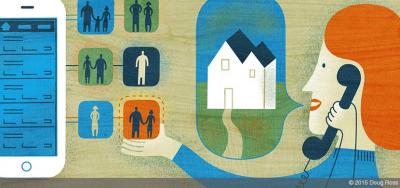You are viewing our site as a Broker, Switch Your View:
Agent | Broker Reset Filters to Default Back to ListMake It Personal
March 19 2015
 When it comes to lead conversion, the Internet could be viewed as a mixed blessing. Ninety-two percent of home buyers go online to look at houses for sale, according to the National Association of REALTORS®' 2014 Profile of Home Buyers and Sellers. That translates to a potential boatload of Internet leads—but also to the time-consuming task of separating the casual browsers from the serious inquiries.
When it comes to lead conversion, the Internet could be viewed as a mixed blessing. Ninety-two percent of home buyers go online to look at houses for sale, according to the National Association of REALTORS®' 2014 Profile of Home Buyers and Sellers. That translates to a potential boatload of Internet leads—but also to the time-consuming task of separating the casual browsers from the serious inquiries.
Large brokerages such as 8z Real Estate in Boulder, Colo., with 104 agents, assign a customer service team to qualify prospects by all available means—phone, text, or live chat—and match them with an agent. Lane Hornung, CEO of 8z, says the customer service reps help ease prospective clients into the homebuying process. "The consumer feels less pressure because many Internet consumers want to stand back a bit," he says.
As co-owner of a four-person team at Keller Williams Performance Realty in Colorado Springs, Colo., Mariana Wagner assigns the qualification process to administrative staff or does it herself. "Most people get into real estate because they're really good at negotiating or they're really good with people," Wagner says, "not because they are really good at converting leads."
The Human Touch
Wagner, who works primarily with listings, has a strong referral base, but she also gets leads from tools such as zBuyer and AgentMachine and from Facebook ads. She's a firm believer in contacting a lead, usually by phone, within five minutes. After that, qualification can take anywhere from 10 minutes to two hours. But it's vital to make contact when the lead is still thinking about real estate, she says. "If you wait too long, they are on to other things, like Facebook," she says. If leads don't respond to a phone call, Wagner reaches out to them with text messages. "We have a remarkably high response rate when we text people," she says.
She also gets a great response to handwritten cards that include information provided by leads during registration. "We have gotten numerous phone calls thanking us for taking the time to handwrite a note," she says.
Wagner's team puts those who don't respond to calls, texts, or cards on a call and e-mail drip campaign. "The more personal you can make these touches, the easier it is to convert," she says. "When you eventually do get a hold of them, they feel like they know you because you've reached out to them on a personal level on so many occasions."
The personal touch can also reveal your fallible, human side. Wagner once got a prospect's attention by mistake: She intended to e-mail a report comparing her company's sales statistics to national data but forgot to attach the report. "This started a conversation, which got us appointments," she says. "It was completely unintentional, but it did work."
Combination Approach
Mobile technology now plays a big role in lead conversion. NAR reports that 50 percent of buyers used mobile devices in their home search. And in 2014, mobile Web search exceeded PC Internet search, according to comScore. That's why Partners Trust Real Estate in Los Angeles is developing a mobile app that will integrate with its website and CRM system, says Audie Chamberlain, vice president of marketing.
As at 8z, agents at Partners Trust rely on customer service reps to sift through leads. Once an agent connects with a prospect, having data at the ready is paramount. "We use Cloud CMA to immediately provide consumers with granular, detailed information about their homes and neighborhood," Chamberlain says. (Want to bring more data to your client interactions? Get the new REALTORS Property Resource® app. There's no cost, and it's exclusively for NAR members.)
Still, never underestimate the importance of the personal touch, Chamberlain says. "Regular, personal contact increases your chances big time."
Walk a Mile in Their Shoes
For Hornung, the key to converting leads from 8z's website is patience combined with quick response and empathy. "You have to put yourself in the other person's shoes," he says.
A big part of that is letting clients tell you how they prefer to be contacted and adapting to accommodate them. Hornung has seen improved conversion rates with texting and online chat.
Whatever the communication mode, maintain contact and be able to move quickly when the client is ready. "You've got to be able to move slow if the consumer wants to move slow," says Hornung. "But if they want to move fast, believe me, they expect you to move fast. And if you can't move fast, they'll find somebody else who does."
To view the original article, visit REALTOR®Mag.









